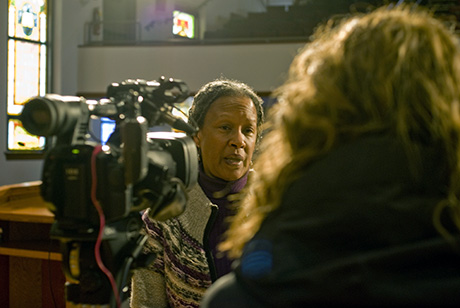
Lecia Brooks, outreach director with Southern Poverty Law Center, speaks with the media following her presentation on Martin Luther King Jr. Day at Monmouth College. (PHOTO BY CLARE HOWARD)
White nationalist organizations are targeting college campuses recruiting students to their racist ideologies. The groups often obscure their real purpose in pseudo-intellectual rhetoric and demand protection under the First Amendment freedom of speech.
“College campuses are ground zero for recruitment,” Lecia Brooks told a full auditorium during her keynote address at Monmouth College on Martin Luther King Jr. Day. “It’s a mistake to allow this to become normal academic discourse.”
Brooks, outreach director at Southern Poverty Law Center, warned against banning groups or resorting to violent protest.
“Continue to engage in nonviolent peaceful protest. Research shows it’s the only way to win,” she said.
SPLC has a map posted on its website (https://www.splcenter.org/hatewatch/2017/10/17/white-nationalist-fliering-american-college-campuses) showing recruitment efforts at colleges across the country. Since March 2016, the organization has tracked 329 incidents leafleting college campuses as part of recruitment efforts. So far, no central Illinois colleges appear on the map.
Quoting King, Brooks opened her talk with this: “Commit yourself to the noble struggle for equal rights. You will make a greater person of yourself, a greater nation of your country and a finer world to live in.”
She views Martin Luther King Jr. Day presentations as an opportunity to review all of King’s speeches. “The man was brilliant!” she said.
On a screen behind her, she projected a series of signs common in Atlanta, Ga., when King was growing up there, including this: “No Dogs, Negros, Mexicans.”
King was just 13 when his teacher took him to a competition where he won an oratory award. Returning home on the bus, he was asked to give up his seat for a white person.
Years later when King was asked to lead the Montgomery bus boycott triggered when Rosa Parks was arrested for refusing to give up her seat, he responded with a personal memory of indignation and a growing understanding of the power of nonviolent protest.
Books said the protest wasn’t just about a seat on the bus but about outright distain for Black passengers. African Americans had to enter the front of the bus to pay their fare and then get off the bus and run to the back door to get a seat at the rear of the bus. Drivers often slammed the doors shut and drove off with the fares but deliberately leaving passengers at the curb.
“Better to walk with dignity than ride in humiliation,” King said. After 380 days, buses were desegregated by court order and the boycott ended.
After his house was firebombed while he was attending an evening meeting, King found armed Black men outside his home trying to protect his wife and infant. He told them this problem can’t be solved with violence. We have to meet violence with nonviolence, King said.
He was not initially involved in the voting rights march from Selma to Montgomery that attracted 600 participants who were brutally attacked by police and state troopers. King learned of the attack and put out a call to ministers across the country, and more than 25,000 people responded for another voting rights march from Selma to Montgomery across the Edmund Pettus Bridge.
“The arch of the universe is long but it bends toward justice,” King said.
2017 was a horrible year that saw a proliferation of hate groups in this country, Brooks said, citing research by SPLC showing an increase by 50 percent over the year 2000.
She said the Charlottesville rally in August was the largest public demonstration of hate in this country since the 1950s. In attendance were the Klan, Neo-Nazis and Neo Confederates.
She concluded with this quote from King: “We will not be satisfied until justice rolls down like water and righteousness like a mighty stream.”
Brooks spoke in Peoria in August co-sponsored by Community Word and Bradley Dept. of Sociology, Criminology & Social Work, African American Studies and Intellectual & Cultural Activities Committee.

2 comments for “College Campuses “Ground Zero” for Racist Recruitment”